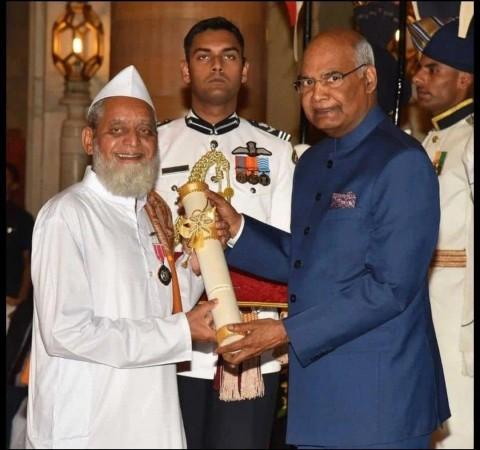Ibrahim Sutar, a linguist folk singer who traveled India preaching Hindu-Muslim unity, died on February 5 in Mahalingpur, Bagalkot district. Around 6.30 a.m., he experienced a major heart attack. According to family reports, he died a few minutes later. He was 82 years old at the time. His family includes his wife, son, and two children.
The winner of the Padmashri award for communal harmony was dubbed as "Karnataka's Kabir." The originator of the 'Bhavaikyate Bhajana Mela' started his career singing Harikathe bhajans in villages and cities. He regaled audiences with stories from Hindu and Islamic scriptures, always emphasizing the need for personal ethics and unity. He performed songs and delivered lectures, citing from a variety of scriptures without the use of notes. He could converse fluently in Kannada and Urdu.

Later on in life, he became a public speaker, speaking on vachana and dasa literature at schools, colleges, and Lingayat mutts. In 1995, he received the Karnataka Rajyotsava award, and in 2018, he received the Padmashri honour.
Ibrahim Sutar: Early life
He dropped out of primary school to work as a weaver's assistant after being born into a poor weaver family in Mahalingpur. Early in life, he developed a spiritual bent of thought. He started going to lectures at the Sri Basavananda Swami mutt and singing bhajans at Sadhu Maharaj shrine. During the month of Ramzan, he was a member of the mosque committee that toured through villages imploring the faithful to rise early. With equal zeal, he studied Hindu and Islamic teachings and formed a group of bhajan singers. The 'Bhavaikyate Bhajana Mela' is a dance festival that takes place in Karnataka and Maharashtra.

A typical performance consisted of a question-and-answer style interwoven with dasa saints and vachanas songs. 'Who is more important in life – god or guru?' said one of the team members, posing a seemingly mundane question with deep spiritual overtones. Sutar gave his perspective, which was addressed towards the audience rather than the team member who continued asking questions, using anecdotes from the Ramayana and Mahabharata, Islamic scriptures, and stories from the lives of prophets.








